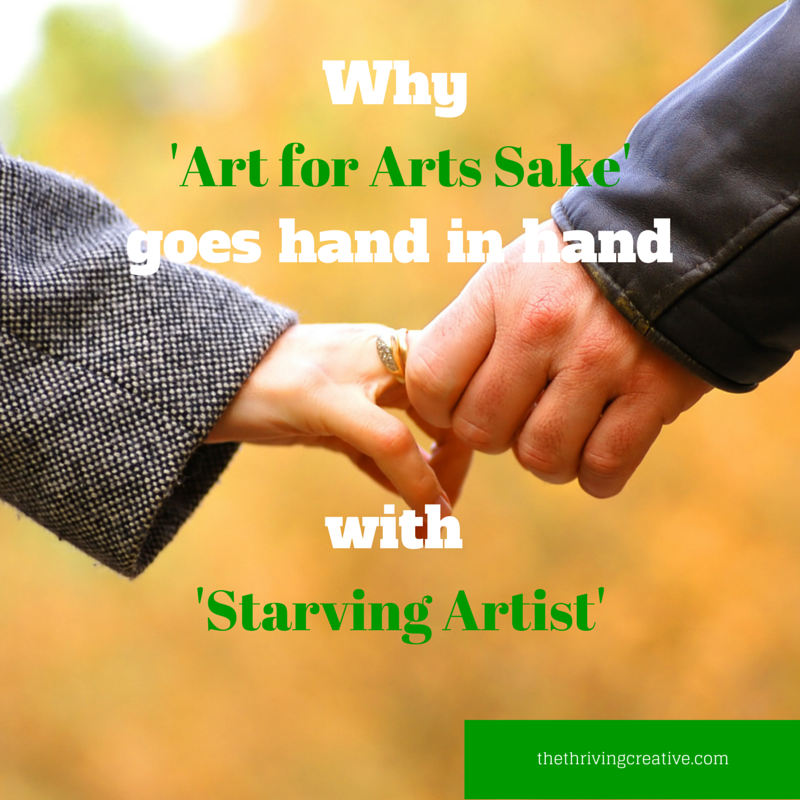Are you putting your artistic ideals above your responsibility for looking after your body and soul?
Are you clinging to romantic notions of ‘art for arts sake?’ That art is only sullied if you let it mingle with the world of commerce?
I’m afraid if you are clinging to these principles you probably aren’t doing yourself any favours at all.
Growing understanding of Creative Entrepreneur
The creative entrepreneur is the antidote to the starving artist. The creative entrepreneurs stands up and says “I’ve got a strong artistic vision, I’ve got good skills in my art form, and I deserve to receive the reward of my talent. I’m not going to hand it off to an agent. I’m not going to hide behind my easel. I’m going to go out and face the world head on and exchange my talents for money. And I will demand to be well paid for what I do. And I will look after myself and my family and husband my talents so I can be in this creative game for a really long time! Dammit!”
But it’s not just me who thinks this.
Check out this piece from The Atlantic. It’s long, but it’s worth it.
The Death of the Artist – and the Birth of the Creative Entrepreneur.
The writer, William Deresiewicz, traces the historical stages of how we understand artists:
1. As craftsmen – predominant through medieval and renaissance times – usually worked on commission
2. As Geniuses doing sacred God-inspired work – from the Romantic period onwards – worked on commission (though they held the power not the person commissioning) or they lived off handouts from others so as not to dirty their art
3. Artist as professional – one who is trained in Universities, develops skills, receives degrees, accumulates credits – post World War II – earned money through grants, juried awards, competitions, as well as university and college teaching positions.
4. Artist as Creative Entrepreneur, using their talents for financial gain – since the turn of the last millennium – the Western World is largely becoming freelancers and artists are the same. There are fewer awards, fewer competitions, fewer juries. Now artists are having to engage directly with the buying public.
Deresiewicz ends the article by saying that he doesn’t think this is necessarily a good transition. It means artists are making art for the market and not expressing their inner worlds. They are creating with an eye to market rather than using art as “a vessel for our inner life.”
Work on Two Planes
I take a slightly different stand. I think artists will operate on two planes – there will be the work you do for your market (what earns you your money, what keeps you alive and able to keep going in the marathon that is a creative career) – and then they will also do the work that is a vessel for their inner life. I think the difference between the old paradigm and the new paradigm is that they won’t necessarily assume that they DESERVE to earn a living by delving into their inner world. “Art for arts sake” may be the work you do because it makes you happy, because it helps you make sense of life, because it helps you work out the questions you have about something. And if you find some people who share your vision, or respond positively to your output, you may sell some of that work, but the ASSUMPTION will be gone that the world owes you sustenance because you express what is inside of you.
That I believe is the big shift
We will all do work that is ‘personal’ which has a smaller audience, which is created with the ‘long tail’ in mind. At the same time, we will also create other work with a definite audience in mind, thinking about what THEY would be interested in and giving it to them. This work might be more ‘commercial’ but we will make it with the best of our talents, skills and abilities and we will foster and develop the audience for it. And we might, from time to time, open up the door and invite them in to view our personal work. And some of them might even buy it.
That’s the the future I see for the creative entrepreneur
I’ll be the actor who does the dog food commercial, or does corporate role play work. And I’ll record the CD of Stephen Sondheim duets with musicians I admire and respect and want to make music with and hope to, over time, recoup my investment and maybe even make a small profit. And in the process I won’t be a ‘starving artist.’ And neither should you.

Leave a Reply